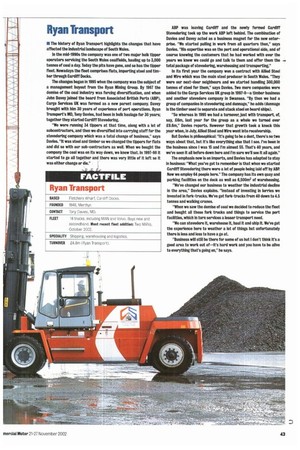Ryan Transport
Page 43

If you've noticed an error in this article please click here to report it so we can fix it.
• The history of Ryan Ii•ansport highlights the changes that have affected the industrial landscape of South Wales.
In the mid-1990s the company was one of two major bulk tipper operators servicing the South Wales coalfields, hauling up to 3,000 tonnes of coal a day. Today the pits have gone, and so has the tipper fleet. Nowadays the fleet comprises flats, importing steel and timber through Cardiff Docks.
The changes began in 1995 when the company was the subject of a management buyout from the Ryan Mining Group. By 1987 the demise of the coal industry was forcing diversification, and when John Davey joined the board from Associated British Ports (ABP), Cargo Services UK was formed as a new parent company. Davey brought with hfm 30 years of experience of port operations. Ryan Transport's MD, Tony Davies, had been In bulk haulage for 30 years; together they started Cardiff Stevedoring.
"We were running 34 tippers at that time, along with a lot of subcontractors, and then we diversified into carrying stuff for the stevedoring company which was a total change of business," says Davies. "It was steel and timber so we changed the tippers for flats and did so with our sub-contractors as well. When we bought the company the coal was on its way down, we knew that. In 1997-98 it started to go all together and there was very little of It left so it was either change or die." ABP was leaving Cardiff and the newly formed Cardiff Stevedoring took up the work ABP left behind. The combination of Davies and Davey acted as a business magnet for the new enterprise. "We started pulling in work from all quarters then," says Davies. "His expertise was on the port and operational side, and of course knowing the customers that he had worked with over the years we knew we could go and talk to them and offer them the total package of stevedoring, warehousing and transporting."
In its first year the company WWI a contract with Allied Steel and Wire which was the main steel producer in South Wales. "They were our next-door neighbours and we started handling 300,000 tonnes of steel for them," says Davies. Two more companies were added to the Cargo Services UK group in 1997-8—a timber business and another stevedore company in Swansea. "By then we had a group of companies in stevedoring and dunnage," he adds (dunnage Is the timber used to separate and stack steel on board ships).
"So whereas in 1995 we had a turnover, Just with transport, of, say, 16m, last year for the group as a whole we turned over 19.6m," Davies reports. However that growth took a knock this year when, in July, Allied Steel and Wire went Into receivership.
But Davies is philosophical: "It's going to be a dent, there's no two ways about that, but it's like everything else that I see. I've been in the business since I was 15 and I'm almost 55. That's 40 years, and we've seen it all before down here and I'm sure we'll see it all again."
The emphasis new is on imports, and Davies has adapted to stay In business: "What you've got to remember is that when we started Cardiff Stevedoring there were a lot of people being laid off by ABP. Now we employ 64 people here." The company has Its own quay and parking facilities on the dock as well as 6,500m2 of warehousing.
"We've changed our business to weather the industrial decline in the area," Davies explains. "Instead of investing in lorries we Invested in fork-trucks. We've got fork-trucks from 40 down to 4.5 tonnes and walking cranes.
"When we saw the demise of coal we decided to reduce the fleet and bought all these fork trucks and things to service the port facilities, which In turn services a lesser transport need.
"We can stevedore it, warehouse it, haul it and ship it. We've got the experience here to weather a lot of things but unfortunately there is less and less to have a go at.
"Business will still be there for some of us but I don't think it's a good area to work out of—It's hard work and you have to be alive to everything that's going on," he says.




























































































































































